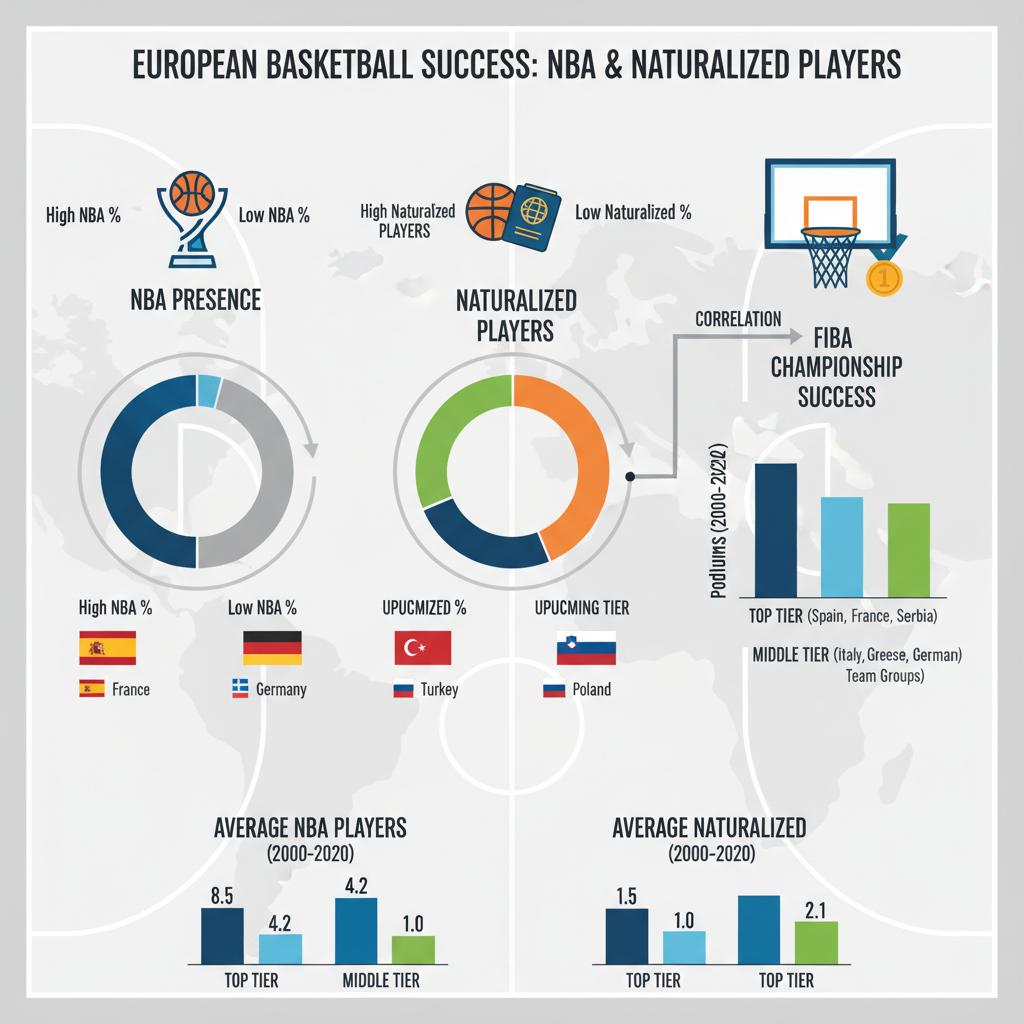Since 1999, FIBA limits each team to only one naturalized player on the roster, which forces teams to rely mostly on native or dual-national players (passport obtained before age 16). This rule aims to maintain competitive balance and national representation authenticity. Many strong teams carefully select their one naturalized player to fill key roster gaps especially at EuroBasket tournaments from 2017 to 2025.
Teams incorporating naturalized players often use them to address specific positional needs (e.g., point guard or centre) not adequately covered by native players, which can enhance overall team performance and competitiveness. For example, the European champion Slovenia in 2017 used the American naturalized player Anthony Randolph effectively alongside Luka Dončić. FIBA rules allow a team to have one naturalized player on their roster who obtained a passport after the age of 16. This creates a loophole for federations to recruit talented players, often from the United States, who have no genuine connection to the country they are representing. It is nationality for convenience. Tyler Dorsey, for instance, a player with Greek heritage who played for Greece in EuroBasket 2025, is still considered “naturalised” by FIBA because he received his passport after the age of 16. Other players, like Jordan Loyd for Poland and Darius Thompson for Italy, acquired citizenship to play in the tournament, despite having no prior ties. This practice is completely different from a player who has a true dual citizenship from birth or has lived in the country for a significant period. While these players may be skilled and contribute to their teams, their presence cheapens the meaning of “national team.” It transforms the competition from a battle of nations into a recruitment war, where the team with the most money and connections can simply buy a star to fill a hole in their roster.
NBA player presence on teams correlates with stronger competitive performance. EuroBasket 2025, for instance, features numerous NBA players across several teams such as Serbia (Nikola Jokić), Germany (Franz Wagner, Dennis Schröder), and France (Bilal Coulibaly). These teams with multiple NBA players generally are regarded as favourites due to elite talent and experience. Teams relying solely on native players without naturalised players sometimes emphasise homegrown talent and strong national basketball traditions (e.g., Latvia in EuroBasket 2025) but may lack the positional flexibility or depth that naturalised players provide. Dual citizenship and naturalisation policies add complexity but offer teams strategic roster-building tools. The trend across the past 5 European Championships (approx. EuroBasket 2009, 2013, 2015, 2017, and 2022/2025) shows increasing integration of NBA talent and naturalized players, with most medal-contending teams having at least one NBA player and a naturalized player selected with tactical purpose. This turns the concept of a true “national team” into a marketing opportunity for the NBA, with fans tuning in not to see national pride, but to watch their favourite players in a different jersey. It dilutes the unique style of European basketball, which traditionally emphasises team-oriented play and structured offences, a point even acknowledged by Giannis’s former coach, Darvin Ham. The focus shifts from the collective to the individual, eroding the very essence of national team competition. Teams with only native players may rely on strong local development but tend to have less roster flexibility and fewer positional specialists brought in via naturalization or NBA experience.
Given the past 5 EuroBasket finals data winners had 1 to 4 NBA players.
- 2022 Spain: Juancho Hernangomez (Toronto Raptors), Willy Hernangomez (New Orleans Pelicans)
- 2017 Slovenia: Goran Dragic (Miami Heat), Luka Doncic (Dallas Mavericks, injured during final but key player)
- 2015 Spain: Pau Gasol (Chicago Bulls)
- 2013 France: Tony Parker (San Antonio Spurs), Nicolas Batum (Portland Trail Blazers)
- 2011 Spain: Pau Gasol, Marc Gasol (Memphis Grizzlies), Serge Ibaka (Oklahoma City Thunder), Ricky Rubio (Minnesota Timberwolves)
- 2009 Spain: Pau Gasol, Marc Gasol, Rudy Fernandez (Portland Trail Blazers
Even outside the NBA, it is the NBA dictating who wins. More NBA players means you win basically. Is it a direct correlation? Well no, because some NBA players don’t impact games or don’t risk injury. So what are we even looking at? Some players playing to become famous while the best players are more concerned with protecting their health or getting knocked out early to return to their real work in the NBA.
And then of course is the second problem. Naturalised players, ie completely irrelevant to the country they are playing for usually, those that didn’t even make it in the NBA but are so good compared to local talent that they get on the teams. For example:
- Turkey: Shane Larkin (naturalized)
- Greece: Tyler Dorsey (naturalized)
- Montenegro: Kyle Allman Jr. (naturalized)
- Bosnia and Herzegovina: John Roberson (naturalized)
- Cyprus: Darral Willis (naturalized)
- Georgia: Kamar Baldwin (naturalized)
- Portugal: Travante Williams (naturalized)
- Italy: Darius Thompson
It is a bit like the old days when the NBA only allowed one negro per team “when the match was tough” as an unofficial rule between the team owners. European teams are playing a silly game with silly rules in fact by having various players naturalised but then only allowing one to play. This is covert racism which leads to a possibly dangerous type of nationalism. The winners are either teams with NBA stars (ie they have learned how to play and have been trained in the NBA) or naturalised players who are the NBA hand me downs. What sort of “national” team is it when the coach has to give instructions in English so that everyone understands?
And that’s not even the start of the problems with this tournament. Injuries come from the players playing too many games. Is it worth it? Why are there so many super weak teams in the tournament? Players get into the temptation to smash records playing against nations that are very weak. It’s not fun to watch either.

Leave a Reply